|
|
|
Sort Order |
|
|
|
Items / Page
|
|
|
|
|
|
|
| Srl | Item |
| 1 |
ID:
151529
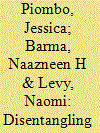

|
|
|
|
|
| Summary/Abstract |
While scholars and practitioners alike argue that the pursuit of sustainable peace in post-conflict developing countries requires international interventions to build state capacity, many debate the precise effects that external assistance has had on building peace in conflict-affected states. This paper seeks to clear conceptual ground by proposing a research agenda that disentangles statebuilding and peacebuilding from each other. Recent scholarship has made the case that the two endeavours are geared towards distinct sets of goals, yet few have subjected the causal mechanism underlying those processes or the relationship between them to sustained theoretical and empirical inquiry. Additionally, despite decades of mixed results from international interventions, we lack knowledge of the mechanisms by which external engagement leads to specific outcomes. To address these gaps, this paper offers a causal framework for understanding the effects of aid dynamics on state coherence and the depth of peace. It specifies the variables in that framework, with a view to establishing a new research agenda to advance our understanding of statebuilding and peacebuilding. Finally, it proposes that public service delivery in post-conflict countries offers fertile empirical ground to hypothesize about and test the relationship between state coherence and sustainable peace.
|
|
|
|
|
|
|
|
|
|
|
|
|
|
|
|
| 2 |
ID:
151534
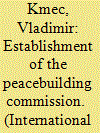

|
|
|
|
|
| Summary/Abstract |
This paper explores the changing distribution of international power by taking the example of the establishment of the United Nations Peacebuilding Commission (PBC). The paper points to tensions between the UN Security Council and the UN General Assembly over the responsibility for the PBC and in the composition of the Commission’s Organizational Committee. These tensions portray the reality of the current international system that is characterized by a shift in the geopolitical power distribution. It is a shift from a system in which the Security Council, strongly marked by the veto power of the permanent members, is responsible for the maintenance of international peace and security to a multilateral one that reflects an increased involvement of non-permanent members in the governance of international peace and security. The Commission marks a transformation of the UN from a system in which power of a state is understood in military terms to one that recognizes the growing importance of other aspects such as economic influence and geographical representation.
|
|
|
|
|
|
|
|
|
|
|
|
|
|
|
|
| 3 |
ID:
151533
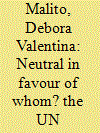

|
|
|
|
|
| Summary/Abstract |
To what extent is making peace not a neutral or impartial exercise? By analysing the peace initiatives undertaken in Somalia and Somaliland (1991–95), this article questions the positionality and alignment of the actors involved, and claims that neither process has been an impartial exercise. To explore this argument the article first theoretically frames how supporters and critics of liberal peace elaborate on the dilemma of neutrality and impartiality. Departing from Lederach’s criticism of impartiality, I claim that the UN–US intervention in Somalia has been an instrument of division, as well as leverage for political and military advantage. External interveners have initially subverted the internal distribution of power, but they lacked the commitment and material capacity of sustaining the preferred ‘winning’ faction. By unpacking the category of ‘local’ I then map the protagonists of the Somaliland pacification, as well the mechanism of institution-building that enabled a multi-scale of stakeholders to sustain the conflict resolution. This analysis contributes to reconceptualise the political architecture of making peace. It also helps to disentangle the study of peace and violence from the myths of the liberal, neutral, intervention doctrine.
|
|
|
|
|
|
|
|
|
|
|
|
|
|
|
|
| 4 |
ID:
151535
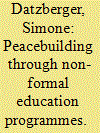

|
|
|
|
|
| Summary/Abstract |
Experts increasingly refer to the crucial role of education in cultivating processes of sustainable peacebuilding in conflict-affected environments. While peacebuilding interventions have slowly started to place emphasis on aspects of equality or service delivery in formal education systems, the potential of non-formal education (NFE) programmes to foster social transformation in conflict-affected environments often remains unexploited. There is little research examining how NFE can affect the security situation and peace process in a conflict-affected region, or the role it plays in peacebuilding at large. To address these questions, the article draws on the case study of the Alternative Basic Education Karamoja (ABEK) programme in Uganda. It is based on a multi-track data collection strategy involving visits to learning centres, focus group discussions and interviews with government officials, teachers, youth, civil society organizations and other stakeholders over a period of three months in 2015. The study finds that, despite persistent implementation challenges, ABEK proved to (a) be relevant to the security and conflict conditions in the region; and (b) overcome structural and indirect forms of violence through alternative and flexible modes of education. The ABEK case therefore gives rise to much wider peacebuilding implications and formal education sector planning in conflict-affected environments.
|
|
|
|
|
|
|
|
|
|
|
|
|
|
|
|
| 5 |
ID:
151531
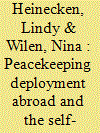

|
|
|
|
|
| Summary/Abstract |
During the last three decades, international peace operations have multiplied. As a consequence, trainings and deployments for peace missions have become an essential part of the military’s work. Yet the importance of peace operations to the individual soldier’s career development has so far been relatively absent in academic writing. This article attempts to fill this gap by examining how soldiers perceive the effects of their peace operation deployments in terms of career opportunities and status upon reintegration in the home unit. Adopting an inductive approach, the authors analyse 50 interviews conducted with military personnel from the South African Defence Force (SANDF). The findings show mixed responses in terms of the effect of deployments on career development. In general senior staff value the experience acquired more highly than lower ranks who experience multiple deployments as having a negative effect on vertical career mobility. Nor do lower ranked personnel see any marked change in the (in) formal status upon reintegration back into their national armed force, while higher staff officers perceive an enhanced status especially where this is related to operational success. The article argues that peacekeeping deployment should be seen as a process, which has consequences for the individual soldiers’ career long after homecoming, rather than as an independent event during a lifelong career.
|
|
|
|
|
|
|
|
|
|
|
|
|
|
|
|
| 6 |
ID:
151532


|
|
|
|
|
| Summary/Abstract |
Current scholarly works in International Relations grew increasingly preoccupied over the effectiveness and programmatic failure of international assistance, especially with regard to issues pertaining to the ‘security–development’ nexus and the post-9/11 ‘securitization’ agenda. Complex Disarmament, Demobilization and Reintegration (DDR) programmes implemented worldwide since the late 1980s became a key component of international post-conflict intervention. With the extension of UN peacebuilding operations, DDR packages, which initially embraced short-term security goals in mere support of negotiated peace settlements, now entail significantly broader development objectives. Located at the interface of security and development approaches, DDR’s third phase, reintegration, has yielded limited outcomes despite growing efforts to implement long-term economic and social recovery activities. Using micro-level data derived from extensive fieldwork conducted in the Democratic Republic of Congo, this article argues that the challenges encountered in implementing reintegration might originate from high politicization of programme outcomes and recurrent neglect of local programme recipients and the socio-economic context in which they evolve. Despite formal endorsement of broad development objectives, this affected reintegration processes and their outcomes since what was really implemented consisted mainly of minimal activities prioritizing immediate security gains.
|
|
|
|
|
|
|
|
|
|
|
|
|
|
|
|
| 7 |
ID:
151530


|
|
|
|
|
| Summary/Abstract |
Ceasefires are a difficult thing to achieve. No more so than in the conflicts of the Middle East. Without ceasefires civilians caught in wars remain vulnerable. As recent events in the Middle East have demonstrated though ceasefires are difficult to negotiate and are far more likely to breakdown than succeed. When it comes to the notion of negotiating ceasefires with Islamist groups, in particular, there is a widely held belief in Western policy-making circles that the task is even harder if not impossible. This is because such counterparts are frequently viewed as holding absolutist goals and positions which are entirely incompatible with peace-making. In this article we present analysis of one such group the Palestinian Hamas movement. we find evidence that far from seeking to prolong conflict Hamas has offered ceasefires and calms on repeated occasions to Israel. This article contends that the willingness of Hamas, however, is circumscribed by the context of conflict and its other actors, as well as the unwillingness of mediators and negotiations to explore inclusion of such groups into the political process.
|
|
|
|
|
|
|
|
|
|
|
|
|
|
|
|
|
|
|
|
|